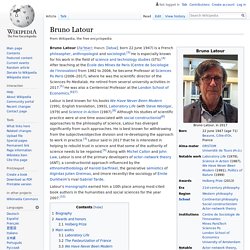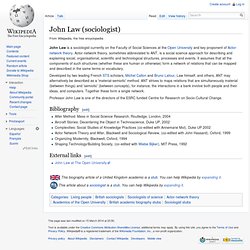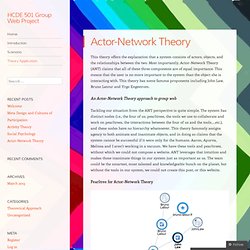

Bruno Latour. Bruno Latour (/ləˈtʊər/; French: [latuʁ]; born 22 June 1947) is a French philosopher, anthropologist and sociologist.[3] He is especially known for his work in the field of science and technology studies (STS).[4] After teaching at the École des Mines de Paris (Centre de Sociologie de l'Innovation) from 1982 to 2006, he became Professor at Sciences Po Paris (2006–2017), where he was the scientific director of the Sciences Po Medialab.

He retired from several university activities in 2017.[5] He was also a Centennial Professor at the London School of Economics.[6][7] Latour's monographs earned him a 10th place among most-cited book authors in the humanities and social sciences for the year 2007.[10] Biography[edit] As a student, Latour originally focused on philosophy and was deeply influenced by Michel Serres. Awards and honors[edit] Holberg Prize[edit] A 2013 article in Aftenposten by Jon Elster criticised the conferment to Latour, by saying "The question is, does he deserve the prize. Bruno Latour. Bruno-latour.fr. John Law. John Law is a sociologist currently on the Faculty of Social Sciences at the Open University and key proponent of Actor-network theory.

Actor-network theory, sometimes abbreviated to ANT, is a social science approach for describing and explaining social, organisational, scientific and technological structures, processes and events. It assumes that all the components of such structures (whether these are human or otherwise) form a network of relations that can be mapped and described in the same terms or vocabulary. Developed by two leading French STS scholars, Michel Callon and Bruno Latour, Law himself, and others, ANT may alternatively be described as a 'material-semiotic' method. ANT strives to maps relations that are simultaneously material (between things) and 'semiotic' (between concepts), for instance, the interactions in a bank involve both people and their ideas, and computers. Together these form a single network. John Law at The Open University.
JohnLaw. About Actor-Network Theory. Broadly speaking, ANT is a constructivist approach in that it avoids essentialist explanations of events or innovations (e.g. explaining a successful theory by understanding the combinations and interactions of elements that make it successful, rather than saying it is “true” and the others are “false”).

However, it is distinguished from many other STS and sociological network theories for its distinct material-semiotic approach. Background and context[edit] ANT appears to reflect many of the preoccupations of French post-structuralism, and in particular a concern with non-foundational and multiple material-semiotic relations. At the same time, it was much more firmly embedded in English-language academic traditions than most post-structuralist-influenced approaches.
Its grounding in (predominantly English) science and technology studies was reflected in an intense commitment to the development of theory through qualitative empirical case-studies. A material-semiotic method[edit] Actor-Network Theory in Plain English. Approach from Actor-Network Theory. This theory offers the explanation that a system consists of actors, objects, and the relationships between the two.

Most importantly, Actor-Network Theory (ANT) claims that all of these three components are of equal importance. This means that the user is no more important to the system than the object she is interacting with. This theory has some famous proponents including John Law, Bruno Latour and Yrgo Engestrom. An Actor-Network Theory approach to group web Tackling our situation from the ANT perspective is quite simple. Pearltree for Actor-Network Theory To learn more about Actor-Network Theory, check out the Pearltree! Theories related Actor-Network Theory Theories related to actor-network theory are activity theory and distributed cognition.
Like this: Like Loading...